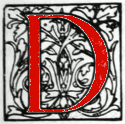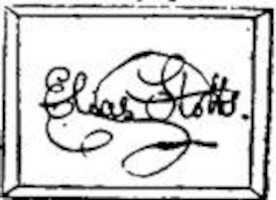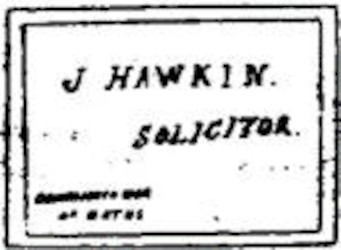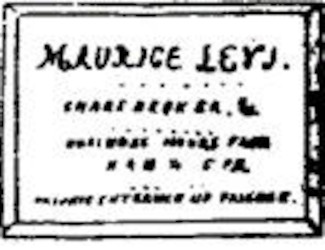This article has been transcribed from a copy of the Cardiff Times in the online collection of scanned Welsh newspapers 1804-1919 in the National Library of Wales, with grateful recognition of the free access accorded to all readers. —— David Skilton

oor-plates! Why, what on earth can there be to write about door-plates some of my worthy readers may be tempted to say to themselves, as they cast their eye over the heading of their faithful Samuel's latest effusion.
To which I reply: There is more than meets the eye in many a door-plate, good reader, as I shall, ere I have, finished my say upon the subject, endeavour to point out.
I' faith, I feel that I could many a tale unfold of Iuring and deceitful door-plates — tales which, if they did not make the hair upon your head to rise up and go grey, would at any rate point out the forcible moral of the tale they adorned.


Left: Eccentric. Right: Neat.
Door-plates are unfrequently as indicative of the kind of man who owns them as the clothes he wears. If an article can be penned about 'Tea Kettles,' or an essay written on 'Ethics of Locks and Keys,' why not one anent the peculiarities, values, and inconvenience of door-plates?
I pause for a reply. Which in all human probability I am most unlikely to obtain.
However, here goes for door-plates. Door-plates, especially those of polished brass, whereon are to be seen in neat black letters the name of their owners, are supposed to be typical of respectabil[l]ity. Any man who can allow himself the extravagance of a brass plate for the purpose of informing the world generally, and his friends in particular, where he resides is, or should be, in a position where the petty pecuniary worries of life are unknown.
In the bonnie land of Scotland no one is supposed to sport a door-plate unless he be a professional man. Yet in this, our island of England, the only bar against a. door-plate of some order or other is the cost of it. Even the common or garden clerk or the 'horny-handed son of toil' can sport a fanciful intimation of his place of abode, provided he be possessed of the wherewithal to pay for it.

Business
Now let us glance at some of the varied specimens of door-plates to be found in a day's peregrination among the business parts of a thriving commercial town.
'Mr John Smith. The blind man,' is the description on the door-plate of a gentleman who is in the full possession of his eyesight. He can 'see as far through a ten-inch wall as anybody else, yet he announces to the world that he is 'the blind man.' Which means that he is a manufacturer of window blinds, and it is on]v his fun that prompts him to delude innocent spectators into the belief that he has lost his eye-sight.
Take, again, the alluring door-plate on which is written neatly but plainly, 'Tom Brown. Financial Agent.' Tom Brown is neither more nor less than a 'cent. per cent.' money-lender, who lives for one object -- money. The term 'financial agent' is a misnomer, and the intimation that there is a 'private entrance up the passage' will convey to the pigeon who has been plucked a very fair notion of the scope and character of the business carried on by Mr Tom Brown, 'financial agent.' The most humbugging of all forms of door-plate is that which announces that So and So —— and company are represented in the office, the front of which it adorns.
It happens, frequently, that the company and the principal are one and the same person, and are embodied in an insignificant individual rejoicing in the cognomen of Snooks or Thompson. Yet his door-plate would lead the public to the belief that he represents an influential and flourishing firm, whereas he is in all probability on the verge bankruptcy.

Mysterious
[This plate reads
Maurice Leys.
Share Broker &c.
Business Hours from
11 a.m. to 5 p.m.
Private Entrance up Passage.]
Funny door-plates are frequently to be found in the country as well as the town, and I remember one – that of a chimney-sweep – which struck me as being quite original. It ran as follows:
'John Jones—'tis right,
Sweeps as well as any man in England
Almost -- not quite.'
There is a candour about this door-plate which is unique, and which puts to shame the announcement that 'Lamb & Bullock' have opened a butcher's shop, or that Mr White has commenced business as a blacksmith, while Mr Black has opened a shop as a whitesmith. Door-plates are both useful and ornamental, but they are not by any means strictly truthful, and often lead unsuspecting people into the toils of those whose honesty is conspicuous by its absence. They are necessary evils, too often, alas! more evil than necessary.
Last modified 29 April 2022